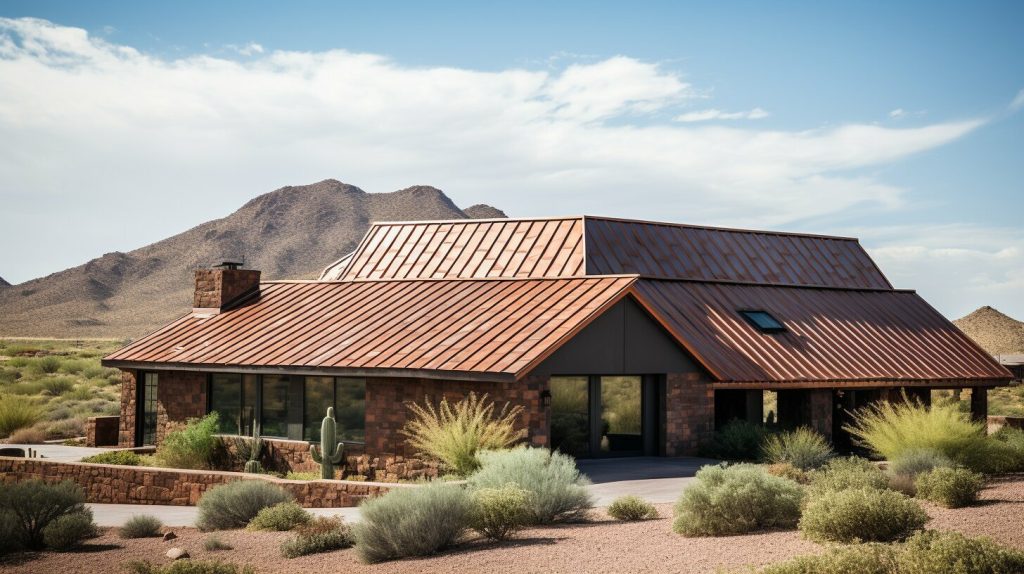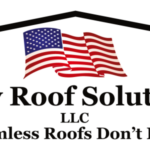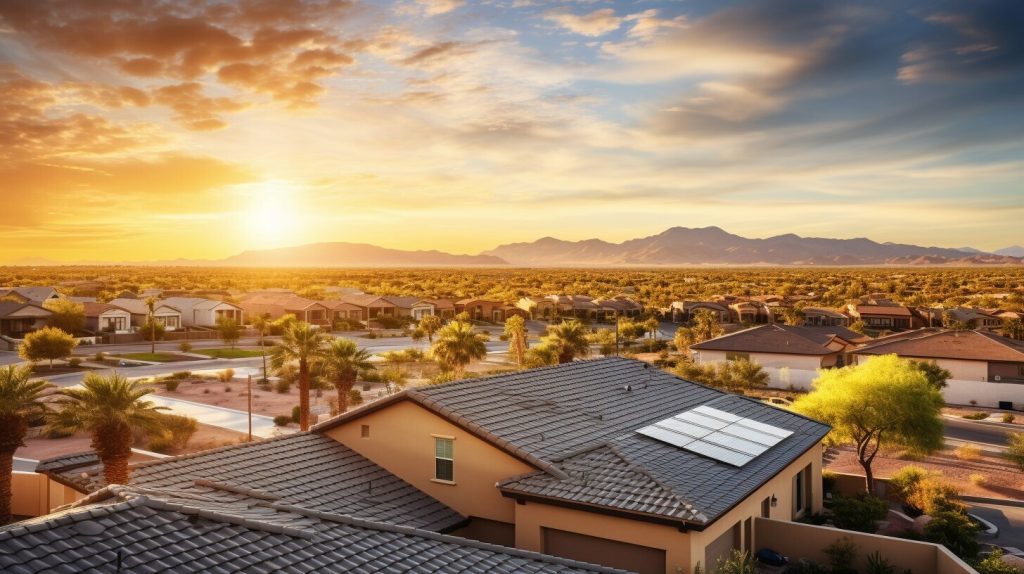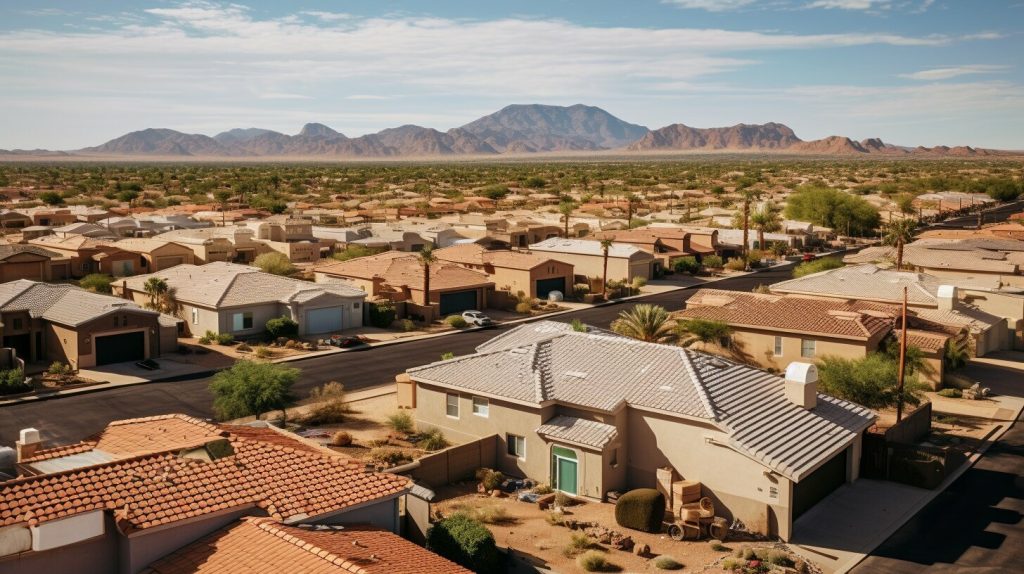As a professional roofing company, we understand the importance of choosing the right roofing material for your business, especially in a place like Arizona. With extreme temperatures and intense sunlight, it’s crucial to select a material that can withstand the harsh Arizona climate and provide longevity and protection for your business property.
In this section, we will explore the various roofing materials available in Arizona and determine which one is best suited for the local climate. We will also discuss the key factors to consider when selecting the right roofing material for your building, including durability, heat resistance, and water resistance.
Key Takeaways
- Choosing the best roofing material for Arizona is crucial for longevity and protection.
- Arizona’s extreme temperatures and occasional monsoons must be taken into account when selecting a roofing material.
- Durability, heat resistance, and water resistance are key factors to consider when selecting the right roofing material for your property.
- The top roofing materials for Arizona building properties include asphalt shingles, tile roofing, metal roofing, foam roofing, and clay roofing.
- With our expert advice, you’ll be able to select the best roofing material for your specific needs, whether you’re replacing your roof or building a new building.
Factors to Consider for Arizona Roofing Materials
When it comes to selecting the best roofing material for Arizona buildings, there are several important factors to consider. Arizona’s climate and weather conditions can be extreme, which can take a toll on a roof’s durability and longevity.
The first factor to take into account is the climate in Arizona. The state experiences hot and dry weather for the majority of the year, with occasional monsoons in the summer months. Therefore, the roofing material must be able to withstand high temperatures and intense sunlight.
Another important consideration is the weather conditions in Arizona. The state’s extreme temperatures can cause expansion and contraction of the roofing material, leading to cracks and leaks. Additionally, the occasional monsoons can bring heavy rainfall and strong winds which can cause damage to the roof.
Arizona’s extreme temperatures also play a significant role in selecting the best roofing material. The material must be able to handle both extreme heat and cold, while also providing insulation to keep the interior of the infrastructure cool during the hot summer months.
Overall, the key factors to consider when choosing a roofing material for Arizona are durability, heat resistance, and water resistance. By taking into account these factors, you can ensure that your roof is able to withstand the unique climate and weather conditions of Arizona.
Top Roofing Materials for Arizona Commercial Buildings
After considering the climate and weather conditions in Arizona, we have determined that the following roofing materials are best suited for the region:
| Roofing Material | Benefits | Drawbacks |
|---|---|---|
| Asphalt Shingles | Easy to install and cost-effective. Available in a wide range of colors and styles. Can withstand high winds and moderate hail. | Not the most durable option. Prone to cracking and fading under intense sunlight. |
| Tile Roofing | Long-lasting and durable. Can withstand extreme heat and sun exposure. Available in a variety of styles to match the architecture of your business property. | Expensive compared to other options. Heavy weight can require additional structural support. |
| Metal Roofing | Highly durable, fire-resistant, and energy-efficient. Can withstand extreme temperatures and sun exposure. Available in a variety of colors and styles. | Expensive compared to other options. Noisier than other materials during rainfall. |
| Foam Roofing | Highly energy-efficient, as it insulates the building. Can be applied to any shape or size roof. Lightweight and seamless. | Not as durable as other materials, can be easily damaged by foot traffic. May require more maintenance over time. |
| Clay Roofing | Long-lasting and durable. Fire-resistant and highly energy-efficient. Can withstand extreme heat and sun exposure. Adds a unique and traditional look to your building. | Expensive compared to other options. Heavy weight can require additional structural support. Can be fragile and easily damaged by foot traffic. |
When choosing a roofing material for your Arizona building, it is important to weigh the benefits and drawbacks of each option and consider your specific needs and budget. We recommend consulting with a professional roofing contractor to help you make the best decision.
Choosing the Best Roofing Material for Your Arizona Commercial Building
Now that we have explored the various roofing materials available in Arizona and discussed the factors to consider, it’s time to choose the best roofing material for your commercial building. This decision is crucial as it can impact your property’s longevity and protection from the elements. Here are some final tips and considerations to help you select the most suitable roofing material:
Determine Your Budget
Before making any decisions, it’s essential to determine your budget for roofing replacement or installation. While some materials may be more expensive upfront, they may provide long-term cost savings due to their durability and energy efficiency.
Consider Energy Efficiency
Arizona’s hot climate necessitates the use of energy-efficient materials to reduce cooling costs. Look for roofing materials that have high solar reflectance and thermal emittance ratings to keep your property cooler during the summer months.
Assess Durability and Maintenance Requirements
The extreme temperatures and occasional monsoons in Arizona can cause wear and tear on your roof. Consider a roofing material that is durable enough to withstand these harsh conditions and requires minimal maintenance to ensure long-lasting protection for your building.
Consult with a Professional
When selecting the best roofing material for your Arizona commercial building, it’s always a good idea to consult with a professional. They can assess your specific needs and provide recommendations based on their expertise and experience.
Ultimately, the best roofing material for your Arizona property will depend on your specific needs, budget, and preferences. By taking into account the unique climate and weather conditions in the region, assessing the durability and maintenance requirements, and consulting with a professional, you can select the best roofing material to ensure longevity, protection, and energy efficiency for your commercial building.
So whether you’re replacing your roof or building a new business, we’re here to help you select the most suitable roofing material. Contact us today to learn more about our services and how we can help you with your Arizona roof replacement or installation.
FAQ
What is the best roofing material for Arizona?
The best roofing material for Arizona depends on various factors such as durability, heat resistance, and water resistance. Some popular options include asphalt shingles, tile roofing, metal roofing, foam roofing, and clay roofing.
What factors should I consider when choosing roofing materials for Arizona?
When selecting roofing materials for Arizona, it is important to consider the unique climate and weather conditions. Factors such as durability, heat resistance, and water resistance are crucial. Arizona’s extreme temperatures, intense sunlight, and occasional monsoons make it essential to choose materials that can withstand these conditions.
What are the top roofing materials recommended for Arizona buildings?
The top roofing materials recommended for Arizona buildings include asphalt shingles, tile roofing, metal roofing, foam roofing, and clay roofing. Each material has its benefits and drawbacks, so it’s important to consider factors such as cost, longevity, and aesthetic appeal when making a decision.
How do I choose the best roofing material for my Arizona commercial property?
To choose the best roofing material for your Arizona commercial building, you should consider the unique needs of your property. Factors such as budget, aesthetic preferences, and durability requirements should be taken into account. Consulting with roofing experts and considering the specific climate conditions in your area can also help guide your decision-making process.





